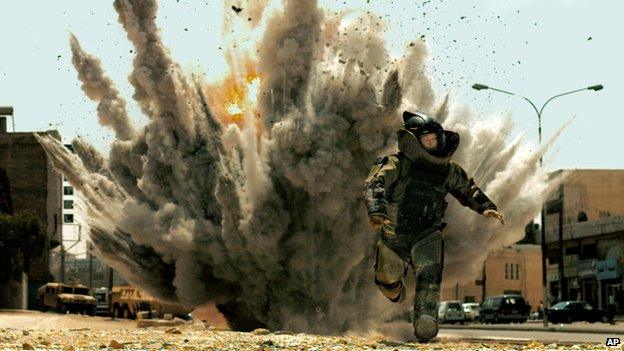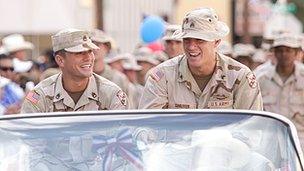Iraq, camera, action: Films struggle with war's legacy
- Published

The thrill of defusing bombs defines Jeremy Renner in The Hurt Locker
The Iraq war was long, bloody and unpopular. For 10 years, movie and television directors have struggled to portray the men and women who fought the battles. How have the war films of our time evolved?
A staff sergeant walks down a supermarket aisle in the 2009 movie The Hurt Locker and stares at the cereal in front of him.
In Iraq, he defused hundreds of bombs, but now he's lost in a maze of Cheerios and Oatmeal To Go. He grabs a cereal box, tosses it in a cart and heads down the aisle, swinging his arm back and forth as if trying to throw off chains.
For many, the scene captures the difficulty of a veteran's homecoming and the anomie of American life.
"There's a disconnect between the experience of war and when he felt useful, and a world of empty choices and banality," says film critic Alissa Quart.
For others, it was less meaningful.
Lt Col Joel Rayburn, who served as an intelligence officer in Iraq, says he does not feel alienated at the supermarket.
"I'm just there to get groceries," he says.

In Stop-Loss characters are treated to a hero's welcome but dread re-deployment
The two different interpretations of the movie show the disparity between those who have fought in Iraq and those who have not - and highlight the challenge of producing shows that are both true to the post-combat experience and that will also resonate with a civilian audience.
A messy, troubling conflict that lasted for years longer than expected, the Iraq war has been a difficult subject for filmmakers and television producers.
In the Academy-Award-winning film about World War II veterans, Best Years of Our Lives, the main characters were "profoundly affected by the events of the war", says Kent Jones, the New York Film Festival's director of programming, but "were expected to get back in the swing of things".
After the Vietnam War, he says, films such as Coming Home and The Deer Hunter portrayed veterans as individuals who "felt they had been sold out by their country".
"With the Iraq war, it's more of a kind of floating sensibility. We don't really know where we are. The circumstances that got us into the war were kind of dubious, and then the war stretched on and on," says Jones.
During the Iraq war, the situation fluctuated, and the films reflected some of these changes. In an early phase, for example, veterans were cast in a positive light, appearing as larger-than-life figures.
In Walking Tall (2004), a veteran is undoubtedly heroic - he's played by action hero Dwayne Johnson, aka The Rock. By the end of the film, a casino has been closed, its corrupt owner sent to prison and the town's mill apparently reopened, thanks in large part to his moral leadership and courage.
In Home of the Brave (2006), veteran characters hit the bottle and lash out, but nevertheless remain noble figures who are able to integrate back into the country they selflessly served.
By this time, though, the war had taken a turn. Americans were fighting a savage insurgency in Iraq, and stories about war crimes committed by American troops began to surface.
A turning point in the portrayal of veterans followed. They were increasingly depicted as troubled, unstable and untrustworthy individuals capable of great violence.
The films were "morally ambiguous", says Scott Foundas, chief film critic for The Village Voice.

In Our Name is about a soldier haunted by the death of an Iraqi girl
In the 2007 film, In the Valley of Elah, a young man goes absent without leave, and his father must retrace his steps.
The film is visually compelling, with moody shots of the New Mexico desert, and tells a wrenching story of what some Americans did in Iraq.
It is also hopelessly dark, portraying veterans as diabolical characters, with no redeeming qualities.
"There's more emphasis on the idea that you've made somebody into a killer, and now they can't stop being a killer," says Phillip Lopate, editor of an anthology, American Movie Critics.
"It means the entire experience of being a soldier has shifted from something heroic to training for psychosis," says Lopate. "It shows a deep revulsion for war, but also a sneaky excitement."
Other films focused on the damage war did to individuals and families: In Stop-Loss (2008), characters become unhinged once they return home - one of them digs a hole in a yard and crawls into it - and resort to drastic measures when they are forced to return to combat.
One year later, The Messenger found the main actors going to see families, telling them that their loved ones had passed away.
"The early movies were trying to show the dark side," says Foundas. "The Messenger is showing more of the human side."
In the final phase of the war, the violence in Iraq decreased and Americans began to return home. The focus in more current films has shifted from the horrors of war to the banality and struggles of peace.
In Our Name, a 2010 film, found a soldier back at home, tormented by what she saw during wartime. Last year's Return features a soldier who comes back from her tour in Iraq aimless and disillusioned, and finding life at home different to when she left.
It is possible that the movie which best captures America's attitudes and veterans' experiences about the war has not yet been made.
"We haven't see a film on Iraq that is comparable to what Apocalypse Now was for Vietnam - when you're moving right into some allegorical realm and showing what this thing meant for us," says Foundas.
"It may be some time, if ever, before we see that kind of movie about Iraq."